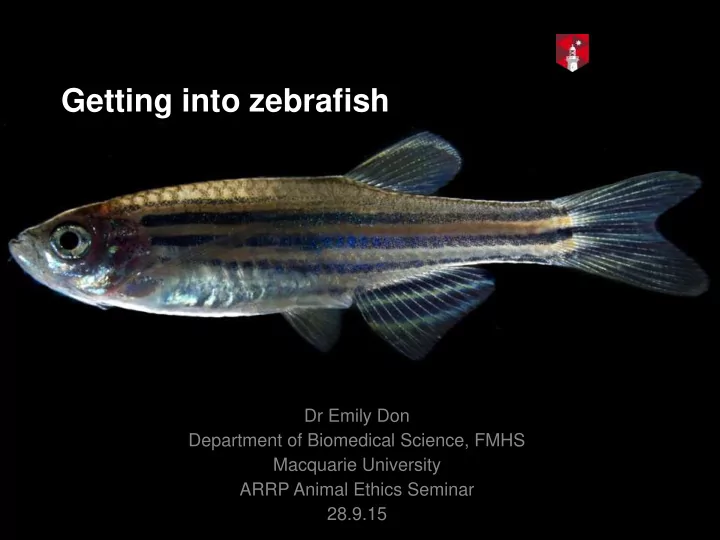

Getting into zebrafish Dr Emily Don Department of Biomedical Science, FMHS Macquarie University ARRP Animal Ethics Seminar 28.9.15
History of zebrafish research • Originated from India and surrounding areas • First used for research in 1951 • Steadily increased in the 1980s at the University of Oregon • Boomed post-1996 after the rise of genetic screens and transgenics Google maps PubMed
Types of research • Developmental studies • Genetics research • Toxicology studies • Models of human disease (cancer, neurodegenerative disorders)
Replacement • Zebrafish can be a replacement where non animal models are not feasible • Embryos are considered a replacement to adult animals -based on nervous system development and free-feeding behaviours -similar guidelines in UK and USA • Fully sequenced genome • Similar organ systems and structures to mammals
Reduction • Use of zebrafish for reduction of research animals used • Adults can produce 200-300 embryos in a clutch -reduced turnover of adult animals -early screening and sampling of embryonic fish reduces fish stock waste
Refinement • Refinement is any decrease in the incidence or severity of 'inhumane' procedures applied to those animals that still have to be used • Most procedures in embryonic zebrafish are non-invasive and only require light anaesthesia
motor neurons/ microglia
Points to be aware of • Constraints on the use of zebrafish -looks like high number of animals -majority are embryos/larvae under 5 days post-fertilisation (dpf) • Issues arising from using zebrafish as research models -fish under 5 dpf are still developing -check the conservation of your organ, structure, tissue, gene • Impact of research protocols -protocols involving fish older than 5dpf (keeping records, use of adults) -experimental end points -age of adult fish -investigators should be aware of signs of disease, -housing of adult fish in appropriate tanks with free flowing water • An open conversation between investigators and the AEC
Acknowledgments and Questions Nicholas Cole Dasha Syal Robyn Gentle The zebrafish 28/09/2015 9
Recommend
More recommend